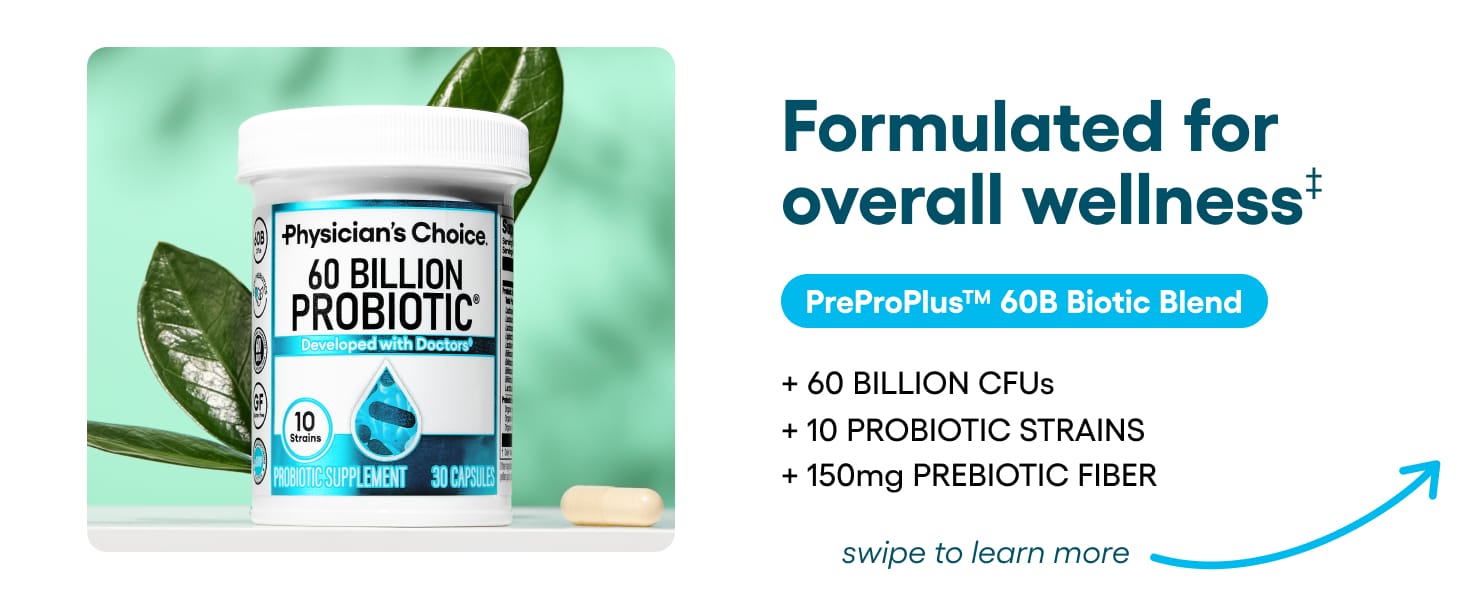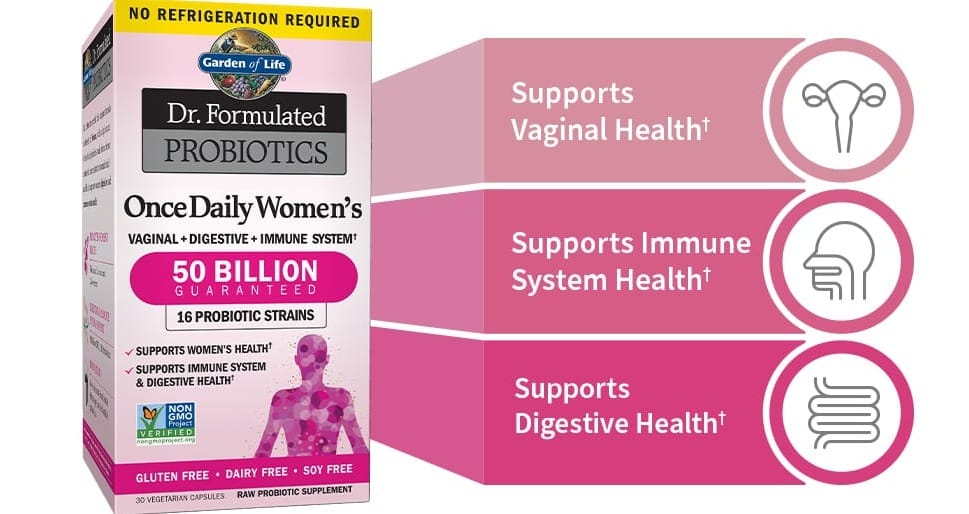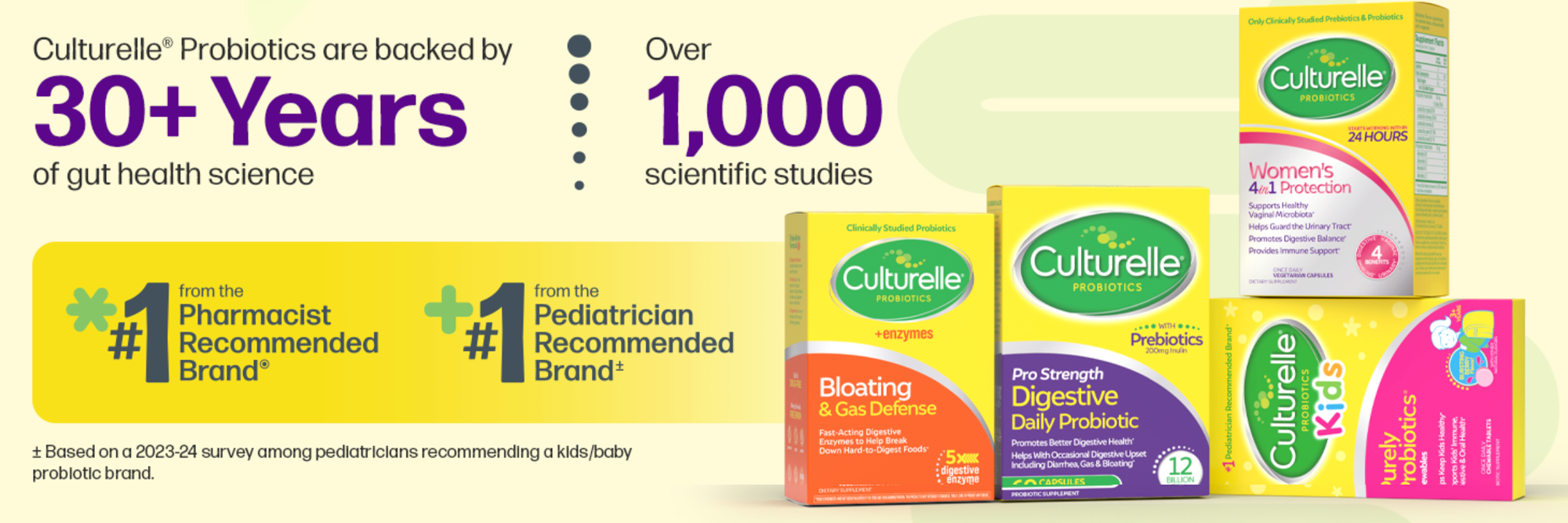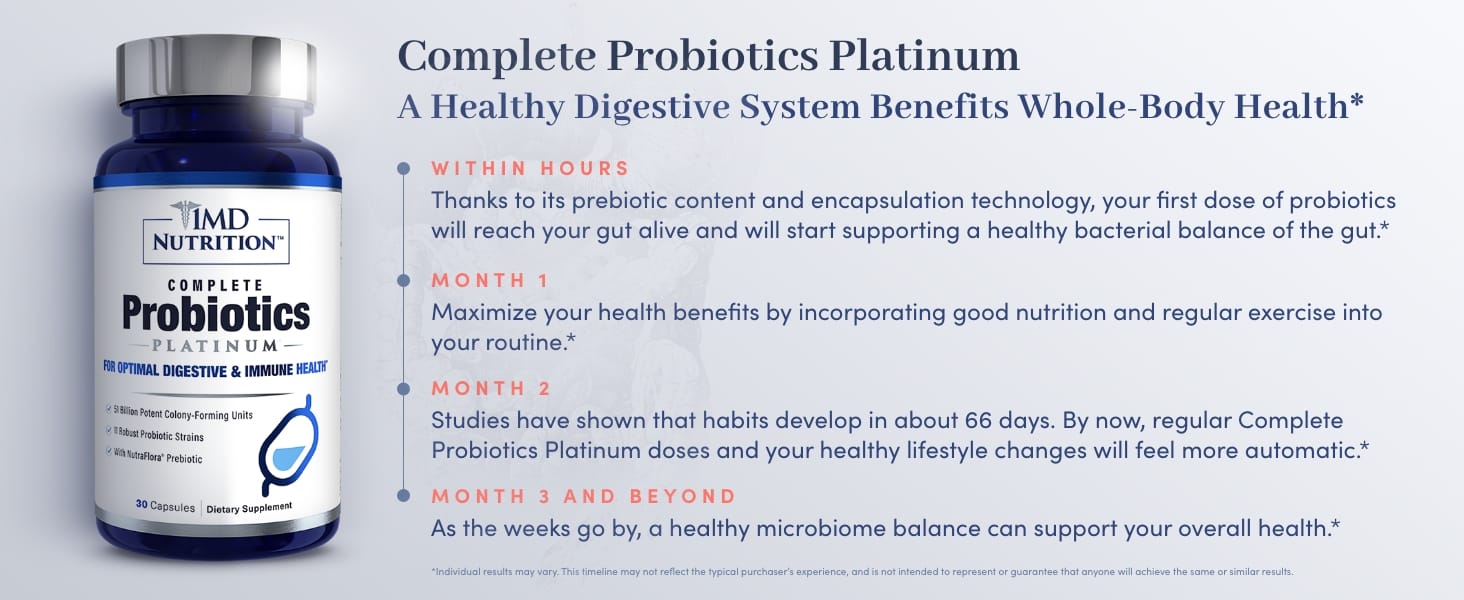Best Probiotics for Gut Health 2025: How to Choose the Right Supplement
Discover the probiotics for gut health, their benefits, and how the right supplement can improve digestion, immunity, & overall wellness.

Your gut health impacts everything from your immune system to your mood, yet most Americans are walking around with compromised digestive systems. If you're experiencing bloating, irregular bowel movements, or digestive discomfort, you're not alone—and the solution might be simpler than you think.
The Gut Health Revolution
Why Probiotics Matter More Than Ever
The human gut microbiome contains over 100 trillion microorganisms, weighing approximately 3-4 pounds in the average adult. This complex ecosystem directly influences your digestive health, immune function, mental well-being, and even your body's ability to maintain a healthy weight.
Recent research reveals alarming statistics about American gut health:
- 70% of Americans experience digestive issues at least once per week
- 60 million Americans are diagnosed with digestive disorders annually
- The average American gut contains 25% less bacterial diversity than people in developing nations
- 1 in 5 Americans take antibiotics annually, which can eliminate up to 90% of beneficial gut bacteria
The growing interest among scientists, healthcare professionals, and the general public has led to explosive growth in probiotic research, with 22% of global food and drinks health information, which included a digestive health claim, also had an immune health claim, highlighting the connection between gut and overall health.
What Are Probiotics and How Do They Work?
Probiotics are live beneficial bacteria and yeasts that support your digestive system's natural balance. When you consume quality probiotic supplements, you're essentially reinforcing your body's army of good bacteria, helping them crowd out harmful microorganisms that can cause digestive distress.
The most researched probiotic strains include:
- Lactobacillus acidophilus: Supports lactose digestion and vaginal health
- Bifidobacterium longum: Enhances immune function and reduces inflammation
- Lactobacillus plantarum: Helps maintain gut barrier function
- Saccharomyces boulardii: Prevents antibiotic-associated diarrhea
- Lactobacillus rhamnosus GG: Reduces duration of infectious diarrhea
Understanding Probiotics: The Foundation of Smart Buying
With the probiotic supplement market projected to reach $77.09 billion by 2025, choosing the right product has become increasingly complex. This comprehensive buyer's guide cuts through the marketing hype to help you make an informed decision based on science, quality, and your specific health needs.
What Makes a Probiotic Effective?
Not all probiotics are created equal. Effective probiotic supplements must contain:
Live, Active Cultures: Dead bacteria provide no benefit. Look for products guaranteeing live cultures through the expiration date, not just at the time of manufacture.
Clinically Studied Strains: Each probiotic strain has unique properties. Generic "Lactobacillus" without strain specification offers little therapeutic value.
Adequate Dosage: CFU (Colony Forming Units) counts must be sufficient to colonize your gut and compete with harmful bacteria.
Survival Mechanism: Beneficial bacteria must survive your stomach's acidic environment to reach the intestines, where they work.
1: Decoding CFU Counts - How Much Do You Really Need?
CFU Ranges and Their Applications
1-10 Billion CFU (Maintenance Level)
- Best For: General digestive wellness, children, probiotic beginners
- Suitable If: You have good digestive health and want preventive support
- Brands to Consider: Culturelle Daily, Align Probiotic Supplement
10-50 Billion CFU (Therapeutic Level)
- Best For: Mild to moderate digestive issues, post-antibiotic recovery
- Suitable If: You experience occasional bloating, irregular bowel movements, or minor digestive discomfort
- Brands to Consider: Garden of Life Dr. Formulated, Physician's Choice
50-100+ Billion CFU (High-Potency Level)
- Best For: Severe digestive disorders, IBS, chronic gut issues
- Suitable If: You have diagnosed digestive conditions or severe symptoms
- Medical Consultation: Recommended before starting high-potency probiotics
CFU Count Red Flags to Avoid
❌ "Trillion CFU" Claims: Unrealistic and often indicate poor quality control
❌ CFU Count at Manufacturing: Only guarantees potency at production, not when you consume it
❌ Generic CFU Claims: "Contains probiotics" without specific counts
❌ Expiration Date Missing: Quality probiotics always include expiration dates with CFU guarantees
2: Probiotic Strains - Your Targeted Health Solution Guide
Digestive Health Strains
Lactobacillus acidophilus
- Primary Benefits: Lactose digestion, nutrient absorption, gut pH balance
- Effective Dosage: 1-10 billion CFU
- Best Combined With: Bifidobacterium bifidum, L. casei
- Clinical Evidence: 200+ published studies
Bifidobacterium longum
- Primary Benefits: Immune support, inflammation reduction, colon health
- Effective Dosage: 1-10 billion CFU
- Best Combined With: L. acidophilus, B. lactis
- Clinical Evidence: Proven effective for IBS symptom reduction
Lactobacillus plantarum
- Primary Benefits: Gut barrier function, bloating reduction, nutrient synthesis
- Effective Dosage: 10-20 billion CFU
- Best Combined With: L. rhamnosus, B. longum
- Clinical Evidence: Effective for maintaining intestinal permeability
Women's Health Strains
Lactobacillus rhamnosus GR-1
- Primary Benefits: Vaginal pH balance, UTI prevention, yeast infection prevention
- Effective Dosage: 1-5 billion CFU
- Best Combined With: L. reuteri RC-14
- Clinical Evidence: Gold standard for women's urogenital health
Lactobacillus reuteri RC-14
- Primary Benefits: Vaginal microbiome balance, bacterial vaginosis prevention
- Effective Dosage: 1-5 billion CFU
- Best Combined With: L. rhamnosus GR-1
- Clinical Evidence: Clinically proven to restore healthy vaginal flora
Immune Support Strains
Lactobacillus casei
- Primary Benefits: Immune system modulation, upper respiratory health
- Effective Dosage: 10-20 billion CFU
- Best Combined With: L. acidophilus, B. longum
- Clinical Evidence: Reduces duration and severity of respiratory infections
Saccharomyces boulardii
- Primary Benefits: Antibiotic-associated diarrhea prevention, C. diff protection
- Effective Dosage: 250-500mg (5-10 billion CFU equivalent)
- Best Combined With: Multi-strain bacterial probiotics
- Clinical Evidence: Extensively studied probiotic yeast with unique benefits
3: Delivery Systems - Ensuring Probiotics Reach Their Destination
Capsule Technologies Compared
Standard Vegetarian Capsules
- Survival Rate: 10-40% through stomach acid
- Best For: Budget-conscious consumers, acid-resistant strains
- Cost: Most economical option
- Timing: Take with food to buffer stomach acid
Enteric-Coated Capsules
- Survival Rate: 60-80% through stomach acid
- Best For: Acid-sensitive strains, empty stomach dosing
- Cost: Moderate premium over standard capsules
- Timing: Can be taken without food
Delayed-Release Technology
- Survival Rate: 80-95% through stomach acid
- Best For: Maximum probiotic delivery, therapeutic applications
- Cost: Premium pricing reflects advanced technology
- Timing: Flexible dosing schedule
Freeze-Dried Powder
- Survival Rate: Variable, depends on mixing and timing
- Best For: Children, mixing into foods/beverages
- Cost: Often more expensive per CFU
- Timing: Must be consumed immediately after mixing
Packaging That Protects Potency
Blister Packs (Best Option)
- Individual dose protection from moisture, light, and oxygen
- Maximum shelf life and potency retention
- Travel-friendly and portion-controlled
Dark Glass Bottles
- Good protection from light degradation
- Requires desiccant packets for moisture control
- Bulk packaging is more economical
Plastic Bottles (Avoid When Possible)
- Poor moisture barrier properties
- Light penetration can degrade probiotics
- Often used for lower-quality products
4: Quality Markers - What Separates Premium from Mediocre
3rd-Party Testing Certifications
NSF International
- What It Tests: Identity, purity, potency, and quality
- Industry Standard: Gold standard for supplement testing
- Consumer Confidence: High - rigorous testing protocols
USP Verified
- What It Tests: Ingredient identity, strength, purity, and disintegration
- Industry Standard: Pharmaceutical-grade testing standards
- Consumer Confidence: Highest - most stringent certification available
Informed Choice/Informed Sport
- What It Tests: Banned substances for athletes
- Industry Standard: Sports supplement certification
- Consumer Confidence: Essential for competitive athletes
Manufacturing Quality Indicators
GMP (Good Manufacturing Practices)
- Minimum Standard: FDA-required for all supplement manufacturers
- What to Look For: "cGMP Certified" on labels
- Red Flag: Products without GMP certification
Organic Certifications
- USDA Organic: Ensures organic ingredient sourcing
- Benefits: No synthetic pesticides, GMO-free ingredients
- Premium Indicator: Higher quality ingredient sourcing
Allergen Testing
- Common Allergens: Dairy, soy, gluten, eggs, nuts
- Importance: Critical for sensitive individuals
- Verification: Third-party allergen testing certificates
5: Storage and Shelf Life - Protecting Your Investment
Refrigerated vs. Shelf-Stable Probiotics
Refrigerated Probiotics
- Advantages: Often higher potency, traditional fermentation methods
- Disadvantages: Inconvenient, cold chain dependency, shorter shelf life
- Best For: Home use, maximum potency requirements
- Storage: 35-40°F (2-4°C), never freeze
Shelf-Stable Probiotics
- Advantages: Convenient, travel-friendly, longer shelf life
- Disadvantages: May have lower potency, specialized processing required
- Best For: Travel, office use, inconsistent storage conditions
- Storage: Room temperature, avoid heat and humidity
Maximizing Probiotic Potency
Temperature Control
- Store refrigerated probiotics consistently cold
- Avoid temperature fluctuations during transport
- Never leave probiotics in hot cars or direct sunlight
Moisture Protection
- Keep desiccant packets in original containers
- Use airtight storage if transferring to pill organizers
- Avoid bathroom storage (high-humidity environments)
Light Protection
- Store in original dark containers when possible
- Keep away from direct sunlight and bright lights
- Consider opaque storage containers for clear bottles
6: Special Considerations for Different Life Stages
Children's Probiotics (Ages 2-12)
Dosage Guidelines:
- Ages 2-4: 1-5 billion CFU
- Ages 5-8: 5-10 billion CFU
- Ages 9-12: 10-15 billion CFU
Child-Friendly Formulations:
- Powder forms for mixing into food/drinks
- Chewable tablets with natural flavoring
- Smaller capsule sizes for easier swallowing
Safety Considerations:
- Choose products specifically formulated for children
- Avoid high-potency adult formulations
- Consult a pediatrician for children under 2
Teen Probiotics (Ages 13-17)
Unique Needs:
- Hormonal changes affecting gut health
- Stress from academic/social pressures
- Often, poor dietary habits
Recommended Strains:
- L. acidophilus for digestive balance
- B. longum for immune support
- L. rhamnosus for stress-related digestive issues
Adult Probiotics (Ages 18-64)
Lifestyle Factors:
- Work stress and irregular schedules
- Frequent antibiotic use
- Dietary indiscretions and processed foods
Targeted Solutions:
- Multi-strain formulas for comprehensive support
- Higher potency for therapeutic effects
- Convenience features for busy lifestyles
Senior Probiotics (Ages 65+)
Age-Related Changes:
- Decreased stomach acid production
- Slower digestive transit time
- Weakened immune system
- Multiple medications affecting gut flora
Senior-Specific Considerations:
- Enteric-coated formulations for better survival
- Immune-supporting strains (L. casei, B. longum)
- Easy-to-swallow capsule sizes
- Drug interaction awareness
7: Budget Guide - Getting the Best Value
Price Ranges and What to Expect
Budget Range ($10-20/month)
- Typical CFU Count: 1-10 billion
- Strain Variety: 1-3 strains
- Quality Features: Basic manufacturing standards
- Best For: Maintenance and prevention
Mid-Range ($20-40/month)
- Typical CFU Count: 10-50 billion
- Strain Variety: 4-8 strains
- Quality Features: Third-party testing, better delivery systems
- Best For: Therapeutic benefits, moderate digestive issues
Premium Range ($40-80/month)
- Typical CFU Count: 50+ billion
- Strain Variety: 8-15 strains
- Quality Features: Advanced delivery, extensive testing, organic ingredients
- Best For: Severe digestive conditions, maximum therapeutic benefit
Cost-Per-CFU Analysis
Calculate True Value:
Monthly Cost ÷ (Daily CFU Count × 30 days) = Cost per billion CFUExample Comparison:
- Product A: $30/month, 50 billion CFU daily = $0.020 per billion CFU
- Product B: $45/month, 100 billion CFU daily = $0.015 per billion CFU
- Better Value: Product B (lower cost per CFU despite higher price)
Money-Saving Strategies
Subscription Services:
- 10-20% discounts for regular deliveries
- Ensures consistent supplementation
- Often includes free shipping
Bulk Purchasing:
- 3-6 month supplies are often discounted
- Verify expiration dates before buying in bulk
- Consider storage requirements
Generic vs. Brand Name:
- Compare active ingredients and CFU counts
- Verify third-party testing for generics
- Brand names often have more clinical research
8: Red Flags - What to Avoid
Marketing Claims That Should Raise Suspicion
❌ "Miracle Cure" Language:
- "Cures all digestive problems"
- "Instant results guaranteed"
- "Better than prescription medications"
❌ Unrealistic Potency Claims:
- Trillion CFU counts
- "Highest potency available"
- No CFU count specified
❌ Vague Ingredient Lists:
- "Proprietary probiotic blend"
- No strain specifications
- Missing CFU guarantees
Quality Control Red Flags
❌ Poor Packaging:
- Clear plastic bottles (light exposure)
- No desiccant packets
- Damaged or unsealed containers
❌ Questionable Manufacturing:
- No GMP certification
- Unknown manufacturing location
- Missing contact information
❌ Pricing Red Flags:
- Prices are significantly below market average
- "Free trial" offers with hidden subscriptions
- No money-back guarantee
9: Making Your Final Decision - The Selection Framework
Step 1: Define Your Health Goals
Digestive Wellness Maintenance:
- Choose: 10-25 billion CFU, 3-5 strains
- Focus: L. acidophilus, B. longum, L. casei
- Budget: $15-25/month
Active Digestive Issues:
- Choose: 25-50 billion CFU, 5-10 strains
- Focus: Multi-strain with targeted benefits
- Budget: $25-40/month
Therapeutic Applications:
- Choose: 50+ billion CFU, 8+ strains
- Focus: Clinically studied formulations
- Budget: $40+ month
Step 2: Assess Your Lifestyle Factors
Convenience Requirements:
- Travel frequently → Shelf-stable options
- Forgetful with supplements → Once-daily formulations
- Sensitive stomach → Enteric-coated capsules
Dietary Restrictions:
- Vegan → Plant-based capsules, no dairy-derived strains
- Allergies → Certified allergen-free products
- Organic preference → USDA Organic certified
Step 3: Evaluate Product Quality
Must-Have Features:
✅ Third-party testing certification
✅ CFU guarantee through expiration
✅ Strain-specific identification
✅ Proper storage requirements listed
✅ Reputable manufacturer with contact information
Nice-to-Have Features:
✅ Prebiotic inclusion
✅ Organic certification
✅ Advanced delivery system
✅ Money-back guarantee
✅ Clinical studies on specific strains
Step 4: Start Smart and Monitor Results
Week 1-2: Adjustment Period
- Start with half the recommended dose if sensitive
- Take with food to minimize side effects
- Monitor for bloating, gas, or digestive changes
Week 3-4: Initial Benefits
- Assess digestive comfort improvements
- Note energy level changes
- Track bowel movement regularity
Months 2-3: Full Therapeutic Effect
- Evaluate overall digestive health
- Consider adjusting dosage if needed
- Assess value and consider long-term use
Your Probiotic Purchase Checklist
Print this checklist and bring it with you when shopping:
Essential Requirements: □ CFU count appropriate for my health goals □ Strain-specific identification (not just genus) □ Third-party testing certification □ Expiration date with CFU guarantee □ Proper packaging for stability □ Reputable manufacturer □ Within my budget range
Quality Indicators: □ GMP certified manufacturing □ Appropriate storage requirements □ Money-back guarantee □ Clear dosing instructions □ Contact information for manufacturer □ Positive verified customer reviews
Personal Considerations: □ Compatible with my dietary restrictions □ Convenient for my lifestyle □ Appropriate for my age group □ No concerning drug interactions □ Realistic health claims
Top Buying Strategies
For Beginners: Start with single-strain, lower potency products from established brands like Culturelle or Align.
For Therapeutic Use: Choose multi-strain, higher potency formulations with enteric coating from brands with clinical research.
For Value Seekers: Calculate cost-per-CFU and consider subscription services for ongoing savings.
For Quality Conscious: Prioritize third-party tested products with organic certifications and advanced delivery systems.
For Convenience: Select shelf-stable, once-daily formulations with travel-friendly packaging.
Remember: The best probiotic is one you'll take consistently. Choose quality over hype, research over marketing claims, and always consult healthcare professionals for serious digestive concerns. Your gut health journey is an investment in your overall wellbeing—choose wisely and stay consistent for optimal results.
Top Picks
1. Physician's Choice Probiotics 60 Billion CFU

Expert Rating: 4.7/5 ⭐⭐⭐⭐⭐
This powerhouse supplement combines 10 probiotic strains with organic prebiotics, making it one of the most comprehensive options available.
Pros:
- 60 billion CFU with clinically studied strains
- Includes organic prebiotic fiber for enhanced effectiveness
- Shelf-stable (no refrigeration required)
- Third-party tested for purity and potency
- Vegetarian capsules suitable for most dietary restrictions
- Excellent value for money
Cons:
- Large capsule size may be difficult for some to swallow
- Takes 2-4 weeks to notice significant improvements
- Contains trace amounts of soy (allergen concern for some)
Best For: Adults seeking comprehensive digestive support with proven strain diversity.
2. Garden of Life Dr. Formulated Probiotics for Women

Expert Rating: 4.6/5 ⭐⭐⭐⭐⭐
Specifically formulated for women's unique digestive and urogenital health needs, this supplement targets both gut and vaginal microbiome balance.
Pros:
- 16 probiotic strains specifically chosen for women's health
- 50 billion CFU per serving
- Includes Lactobacillus strains that support vaginal health
- Once-daily convenience
- Gluten-free, dairy-free, and soy-free
- Delayed-release capsules protect against stomach acid
Cons:
- More expensive than general probiotics
- Gender-specific formulation limits household sharing
- Some users report initial bloating during the first week
Best For: Women dealing with recurring UTIs, yeast infections, or hormonal digestive issues.
3. Culturelle Digestive Daily Probiotic

Expert Rating: 4.5/5 ⭐⭐⭐⭐⭐
Culturelle, being our best pick overall according to recent expert reviews, this supplement focuses on the clinically proven Lactobacillus rhamnosus GG strain.
Pros:
- Contains the most researched probiotic strain (LGG)
- 10 billion CFU per capsule with guaranteed potency
- Decades of clinical research support the effectiveness
- Small, easy-to-swallow capsules
- No refrigeration required
- Suitable for children and adults
Cons:
- Single-strain formula (less diversity than multi-strain options)
- Higher cost per CFU compared to competitors
- Some users need higher CFU counts for optimal results
Best For: Beginners to probiotics or those with sensitive digestive systems seeking a gentle, proven option.
4. Ritual Synbiotic+ (Vegan Option)

Expert Rating: 4.4/5 ⭐⭐⭐⭐⭐
Best vegan probiotic: Ritual Synbiotic+, according to recent expert analysis, this supplement combines probiotics with prebiotics and postbiotics for comprehensive gut support.
Pros:
- 100% vegan and sustainably sourced
- Combines probiotics, prebiotics, and postbiotics (3-in-1 formula)
- Clinically studied strains with published research
- Delayed-release capsules ensure survival through stomach acid
- Transparent supply chain and ingredient sourcing
- Subscription service ensures you never run out
Cons:
- Premium pricing reflects high-quality ingredients
- The subscription model may not appeal to all customers
- Limited availability in physical stores
Best For: Health-conscious consumers prioritizing vegan, sustainably sourced supplements with cutting-edge formulations.
5. 1MD Complete Probiotics Platinum

Expert Rating: 4.3/5 ⭐⭐⭐⭐⭐
This physician-formulated supplement delivers 51 billion CFU across 11 clinically studied strains, positioning itself as a premium therapeutic option.
Pros:
- Formulated by medical doctors
- 51 billion CFU with 11 diverse strains
- Includes NutraFlora prebiotic for enhanced colonization
- Delayed-release vegetarian capsules
- No artificial colors, flavors, or preservatives
- 90-day money-back guarantee
Cons:
- Higher price point than most competitors
- Large capsule size
- Some customers report stomach discomfort during the initial adjustment period
Best For: Individuals with serious digestive issues seeking physician-grade formulations with maximum potency.
Frequently Asked Questions
1. How long does it take for probiotics to work?
Most people begin experiencing improvements in digestive comfort within 3-7 days of consistent probiotic use. However, significant changes to your gut microbiome typically take 4-12 weeks. For optimal results, take probiotics daily for at least 30 days before evaluating effectiveness.
The timeline varies based on:
- Your starting gut health condition
- Probiotic strain potency and diversity
- Dietary habits and lifestyle factors
- Consistency of supplementation
2. Should I take probiotics with or without food?
The timing depends on your specific probiotic formulation:
With Food (Most Probiotics): Taking probiotics with meals, especially those containing healthy fats, improves bacterial survival through stomach acid. The food buffers stomach acid, creating a more favorable environment for live cultures.
Empty Stomach (Enteric-Coated): Delayed-release or enteric-coated probiotics are specifically designed to survive stomach acid and should be taken 30 minutes before meals or 2 hours after eating.
Check Your Label: Always follow manufacturer instructions, as formulations vary in acid resistance.
3. Can I take probiotics with antibiotics?
Yes, but timing is crucial. Antibiotics eliminate both harmful and beneficial bacteria, making probiotic supplementation even more important during treatment.
Best Practice:
- Take probiotics 2-3 hours after antibiotic doses
- Continue probiotics for 2-4 weeks after completing antibiotics
- Choose multi-strain probiotics with 25+ billion CFU
- Consider Saccharomyces boulardii, a beneficial yeast unaffected by antibiotics
Medical Consultation: Always inform your healthcare provider about probiotic use alongside prescription medications.
4. Are expensive probiotics worth the higher cost?
Price doesn't always indicate quality, but several factors justify premium pricing:
Worth Higher Cost:
- Third-party testing and quality certifications
- Clinically studied strains with published research
- Proper packaging protects bacterial viability
- Higher CFU counts with guaranteed potency through expiration
- Added prebiotics and postbiotics
Red Flags:
- Proprietary blends hiding actual CFU counts
- Unrealistic health claims
- No refrigeration guidance for temperature-sensitive strains
- Missing expiration dates
Sweet Spot: Look for products in the $25-45 range offering 25-50 billion CFU with 5+ strains from reputable manufacturers.
5. What are the side effects of taking probiotics?
Most people tolerate probiotics well, but temporary side effects can occur as your gut microbiome adjusts:
Common Initial Side Effects (1-2 weeks):
- Mild bloating or gas
- Changes in bowel movement frequency
- Slight stomach discomfort
- Increased thirst
Serious Concerns (Seek Medical Attention):
- Severe abdominal pain
- High fever with digestive symptoms
- Blood in stool
- Signs of infection
Minimizing Side Effects:
- Start with lower CFU counts and gradually increase
- Take probiotics with food
- Stay hydrated
- Choose reputable brands with quality testing
Who Should Avoid Probiotics: People with compromised immune systems, severe underlying health conditions, or those taking immunosuppressive medications should consult healthcare providers before starting probiotics.
Key Takeaways
Your Path to Better Gut Health
The journey to optimal digestive health doesn't happen overnight, but choosing the right probiotic supplement is a crucial first step. Age-related changes in the gut microbiome reshape its influence across all metabolic functions—from digestion and energy balance to immune response and cellular health—with profound implications for longevity, making probiotic supplementation increasingly important as we age.
Remember These Essential Points:
🎯 Quality Over Quantity: Focus on clinically studied strains and third-party testing rather than the highest CFU count
🕒 Consistency is Key: Take probiotics daily for at least 30 days to allow your gut microbiome to stabilize
🥗 Support with Diet: Combine probiotics with prebiotic-rich foods like garlic, onions, and fiber-rich vegetables
💊 Start Slowly: Begin with lower potency supplements to minimize adjustment side effects
🩺 Consult Professionals: Work with healthcare providers, especially if you have underlying digestive disorders
The probiotic market will continue evolving as research reveals new connections between gut health and overall wellness. By choosing quality supplements and maintaining consistent use, you're investing in your long-term health, energy levels, and quality of life.
Whether you're dealing with occasional digestive discomfort or seeking to optimize your overall wellness, the right probiotic supplement can be a game-changer for your health journey. Start with one of our recommended options, stay consistent with your routine, and give your gut the support it deserves.
